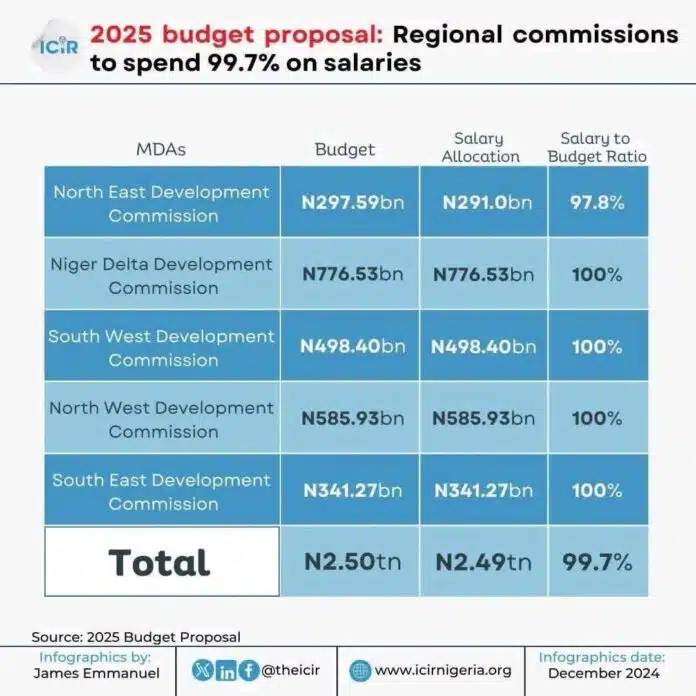…Allegations of Mismanagement Surface as Budget Prioritizes Salaries Over Infrastructure Across Nigeria’s Underdeveloped Zones
By: Daure David
A major regional development commission established under the administration of President Bola Ahmed Tinubu is facing increasing public scrutiny for operating without a clear development plan while allocating an overwhelming 96% of its budget to salaries and overhead costs.
Sources within the commission and budgetary oversight officials, who spoke on condition of anonymity, described the agency as “grossly inefficient,” raising concerns over its financial sustainability and relevance to the nation’s long-term development objectives.
No Blueprint, No Direction
Despite its lofty mandate to stimulate growth and infrastructure development in underserved regions, the commission whose name is being withheld pending an official response is reportedly functioning without any comprehensive master plan, road map, or measurable performance indicators.
“There is no strategic framework guiding their operations,” said one official familiar with the agency’s inner workings. “What we have is a bloated administrative structure consuming nearly the entire budget while the communities it was created to serve remain neglected.”
Budget Breakdown Raises Alarm
A review of the commission’s most recent financial statement reveals that over 96% of its annual budget is spent on recurrent expenses, primarily personnel salaries, allowances, and office maintenance. That leaves a meager 4% for capital projects, capacity building, or actual development initiatives in the regions under its jurisdiction.
“This is the very definition of institutional failure,” said a senior economist with a development watchdog group. “You cannot call yourself a development agency when you’re spending almost all your funds on yourselves.”
Criticism from Civil Society
Civil society groups have called on the Tinubu administration to either overhaul the commission or dissolve it entirely, arguing that it has become a drain on public resources.
“It’s another example of a federal agency created not to serve the people, but to provide political patronage,” said Mariam Usman, spokesperson for the Centre for Fiscal Accountability. “Nigerians deserve better than commissions that exist only on paper and payroll.”
No Official Response Yet
Repeated attempts to obtain a comment from the commission’s spokesperson were unsuccessful. The Ministry of Budget and Economic Planning also declined to respond to inquiries as of press time.
A Pattern of Dysfunction?
This is not the first time a government-established commission has come under fire for financial mismanagement. Observers note similarities with past regional development bodies that were plagued by corruption, lack of transparency, and underperformance, including the Niger Delta Development Commission (NDDC), which has faced multiple probes over the years.
With Nigeria grappling with economic pressures, soaring unemployment, and crumbling infrastructure, analysts warn that wasteful institutions with little to no impact are luxuries the country can no longer afford.
Sidebar: Where the Money Goes
Personnel Costs: 82%
Allowances & Welfare: 10%
Office Operations: 4%
Development Projects: 4%
What Next?
Policy experts are urging President Tinubu to demand accountability from all federal commissions, especially those established under his administration, to prove they are not mere vehicles for political compensation but engines of real change.
“We cannot develop Nigeria through paperwork and salaries,” one observer noted. “The time for action is now.”







